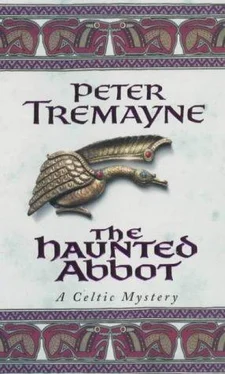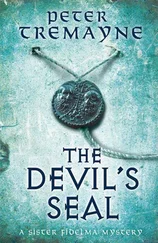Peter Tremayne - The Haunted Abbot
Здесь есть возможность читать онлайн «Peter Tremayne - The Haunted Abbot» весь текст электронной книги совершенно бесплатно (целиком полную версию без сокращений). В некоторых случаях можно слушать аудио, скачать через торрент в формате fb2 и присутствует краткое содержание. Жанр: Исторический детектив, на английском языке. Описание произведения, (предисловие) а так же отзывы посетителей доступны на портале библиотеки ЛибКат.
- Название:The Haunted Abbot
- Автор:
- Жанр:
- Год:неизвестен
- ISBN:нет данных
- Рейтинг книги:5 / 5. Голосов: 1
-
Избранное:Добавить в избранное
- Отзывы:
-
Ваша оценка:
- 100
- 1
- 2
- 3
- 4
- 5
The Haunted Abbot: краткое содержание, описание и аннотация
Предлагаем к чтению аннотацию, описание, краткое содержание или предисловие (зависит от того, что написал сам автор книги «The Haunted Abbot»). Если вы не нашли необходимую информацию о книге — напишите в комментариях, мы постараемся отыскать её.
The Haunted Abbot — читать онлайн бесплатно полную книгу (весь текст) целиком
Ниже представлен текст книги, разбитый по страницам. Система сохранения места последней прочитанной страницы, позволяет с удобством читать онлайн бесплатно книгу «The Haunted Abbot», без необходимости каждый раз заново искать на чём Вы остановились. Поставьте закладку, и сможете в любой момент перейти на страницу, на которой закончили чтение.
Интервал:
Закладка:
Fidelma followed the farmer inside and Mul closed the door behind her. The hound glanced up and growled softly but made no move.
‘Bragi will not harm you while he sees that you are no enemy to me.’
Fidelma smiled softly and removed her double-cloak before edging near the fire and bathing in its warmth.
There was a big metal cauldron hanging from a spit over the leaping flames filled with some aromatic stew. Its fragrance permeated the tiny two-roomed stone farmhouse. Mul moved to it and took down a ladle, stirring it and examining the contents.
‘Pork stew,’ he said by way of explanation. ‘It will be ready soon.’
Mul was as she remembered him, with thick-set shoulders, a muscular torso, a coarse ruddy face and a thick pug nose. He was, in a word, ugly, but even with his close-set eyes and beakof a nose, and the glimpse of broken, yellowing teeth, there was something amiable about his attitude.
She glanced round the room. It was the usual living room with a central hearth for cooking. It was grey and smoky from the fire but the warmth was welcome even though the smoke tickled her sore throat. The second room bespoke a wealth not many such farmers had. This second room did not extend all the way to the roof but was capped by boards creating a third room, open on one side to the main living room from which a ladder gave access.
It seemed clear that Mul used neither this loft room nor the second room for there was a wooden cot on the far side of the hearth which appeared to be his bed. Most people would sleep next to the hearth during the winter months for it was the logical place to keep warm. It was gloomy, for the place was only lit by the light of the fire. As if reading her thoughts, Mul bent to the fire and lit a taper. Then he moved to a lamp and set its wick alight.
‘A cup of cider to warm the spirit?’ he inquired, setting the lamp on the table.
She nodded silently as she rubbed her arms to restore the circulation.
Mul went to a wooden cupboard and took out some clay beakers which he filled from a flagon.
‘The God of the Christians could only create water,’ he smiled as he handed her a beaker, ‘but Aegir, the god of the Saxons, created cider, and provided the Aesir with their sacred drink at the autumnal equinox.’
Fidelma frowned. She had forgotten that Mul was a pagan. No wonder she saw none of the symbols with which a Christian would usually festoon the house to mark this day. She still had to remind herself that this was the day of the birth of Christ.
‘So you still believe in your old gods, Mul?’
Mul grinned broadly. ‘When I have need to, woman.’
She paused for a moment and took a sip at the cider that he had given her. It was sweet, strong and good in her aching throat.
‘You have a large house, Mul.’ She decided to ignore his implied invitation to engage in an argument on religion. She noticed a shadow cross his face.
‘Aye,’ he said shortly.
‘You have not married?’
Mul shifted his weight from one foot to another.
‘I was married … once.’
‘What happened?’
‘You ask many questions for a woman,’ snapped Mul.
‘I am of an inquisitive nature,’ replied Fidelma solemnly. Then she suddenly remembered. ‘Ah, but I recall now. In your culture, you do not think it is fitting that women assert themselves as equals to men and ask questions.’
Mul glowered a little and it was clear that he was somewhat at a loss to know how to deal with her self-assertive and assured manner.
‘I have come across religieuses of your nation before. I find it strange that your menfolk have allowed you this much freedom.’
The door opened suddenly. The hound leapt up and only a sharp command from Mul stopped it from springing forward. Eadulf stood in a flurry of snow before turning and pressing the door closed behind him.
‘Sit, Bragi! Sit!’ ordered Mul. Then he turned to Eadulf with a scowl. ‘You had best be more cautious, gerefa, ’ he admonished. ‘I do not keep the hound as a pet. Bragi is a guard dog.’
Eadulf replied with a noncommittal grunt, removed his cloak and sat down.
‘The weather seems to be worsening,’ he said, after accepting a cup of cider from Mul.
The farmer sat by the fire and the hound placed its head on one of his feet.
‘You are right, gerefa. This winter has seen more blizzards than I recall. Many beasts have perished around these parts. We poor farmers suffer as always, and when the King’s men come to demand the King’s taxes, it will be spring and the winter damage will be forgotten. We will have to pay or suffer confiscation. But that is the way of things. They will not alter. The King’s men come down like thieves and take almost everything apart from that which allows us to survive until the next time of shearing.’
Fidelma smiled sympathetically.
‘A learned man called Suetonius wrote that it is the part of the good shepherd to shear his flock, not to flay it.’
Mul glanced at her with sudden appreciation.
‘Your woman has a good mind,’ he confessed to Eadulf, ‘but she does not know the King’s tax gatherings. They would, indeed, remove the skin from the body if it was worth anything to them.’
‘But, surely, such a winter as this would be borne in mind?’ Eadulf argued.
‘We have had bad winters but this is the worst I recall. You are from these parts, gerefa. You must bear witness to what I am saying.’
‘You are right that I cannot recall a winter so cold and foul, and for giving us hospitality from the inclement elements we must thank you,’ Eadulf replied.
Mul put his head back and roared with laughter.
Eadulf exchanged a glance with Fidelma and frowned.
‘What amuses you?’
‘That you presume that I am giving you hospitality.’ He emphasised the word ‘giving’.
‘I do not understand,’ Eadulf rejoined.
‘I’ll give you shelter and food but for a price.’
Eadulf’s features tightened in annoyance.
‘I remember that you charged to drive us to the abbey. I should have suspected that you would not bring people out of a blizzard and allow them to share your home for nothing.’
Mul was grinning. ‘As a farmer I have learnt that money is like dung. It does no good unless it is spread, gerefa. I perceive that you have some to spread and that will help me survive the losses I will endure this winter.’
‘That is not a Christian idea of charity …’ protested Eadulf.
‘As the woman will remind you,’ returned Mul, ‘I am not a Christian.’
‘Eadulf,’ Fidelma interrupted softly, ‘the man has a point. A quid pro quo — something for something.’
Mul nodded towards her.
‘A good philosophy, woman. Two things that are important, a good mind and the ability to use it. I am sure that you will not begrudge me a penny for this night’s lodging, for the blizzard is set in now. You will not be able to leave here until tomorrow morning.’
Eadulf was disapproving.
‘I fear that you have many faults, Mul.’
Mul grinned back.
‘Is it not said that money will hide many faults?’ he countered.
‘Very well, Mul,’ sighed Eadulf. ‘But as you did not receive your fee until you had delivered us to the abbey, nor shall you receive your fee until we are about to depart.’
Mul grinned without rancour.
‘It is agreed, gerefa. And now I think my stew is ready. It is a sparse meal, for I was not expecting guests, but there is plenty of cheese and bread to follow. Seat yourselves,’ he added, indicating the table.
‘Can we do anything?’ inquired Fidelma politely.
Mul hesitated and then grimaced.
‘No, thank you, woman. I have grown used to my own company and way of doing things.’
Читать дальшеИнтервал:
Закладка:
Похожие книги на «The Haunted Abbot»
Представляем Вашему вниманию похожие книги на «The Haunted Abbot» списком для выбора. Мы отобрали схожую по названию и смыслу литературу в надежде предоставить читателям больше вариантов отыскать новые, интересные, ещё непрочитанные произведения.
Обсуждение, отзывы о книге «The Haunted Abbot» и просто собственные мнения читателей. Оставьте ваши комментарии, напишите, что Вы думаете о произведении, его смысле или главных героях. Укажите что конкретно понравилось, а что нет, и почему Вы так считаете.











